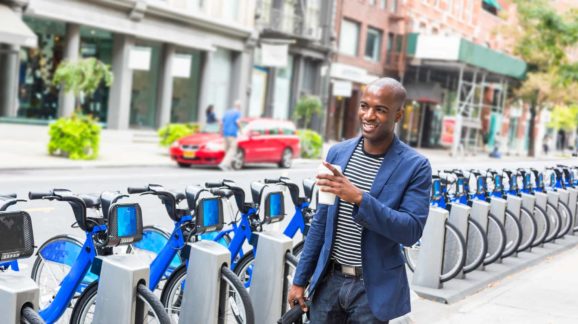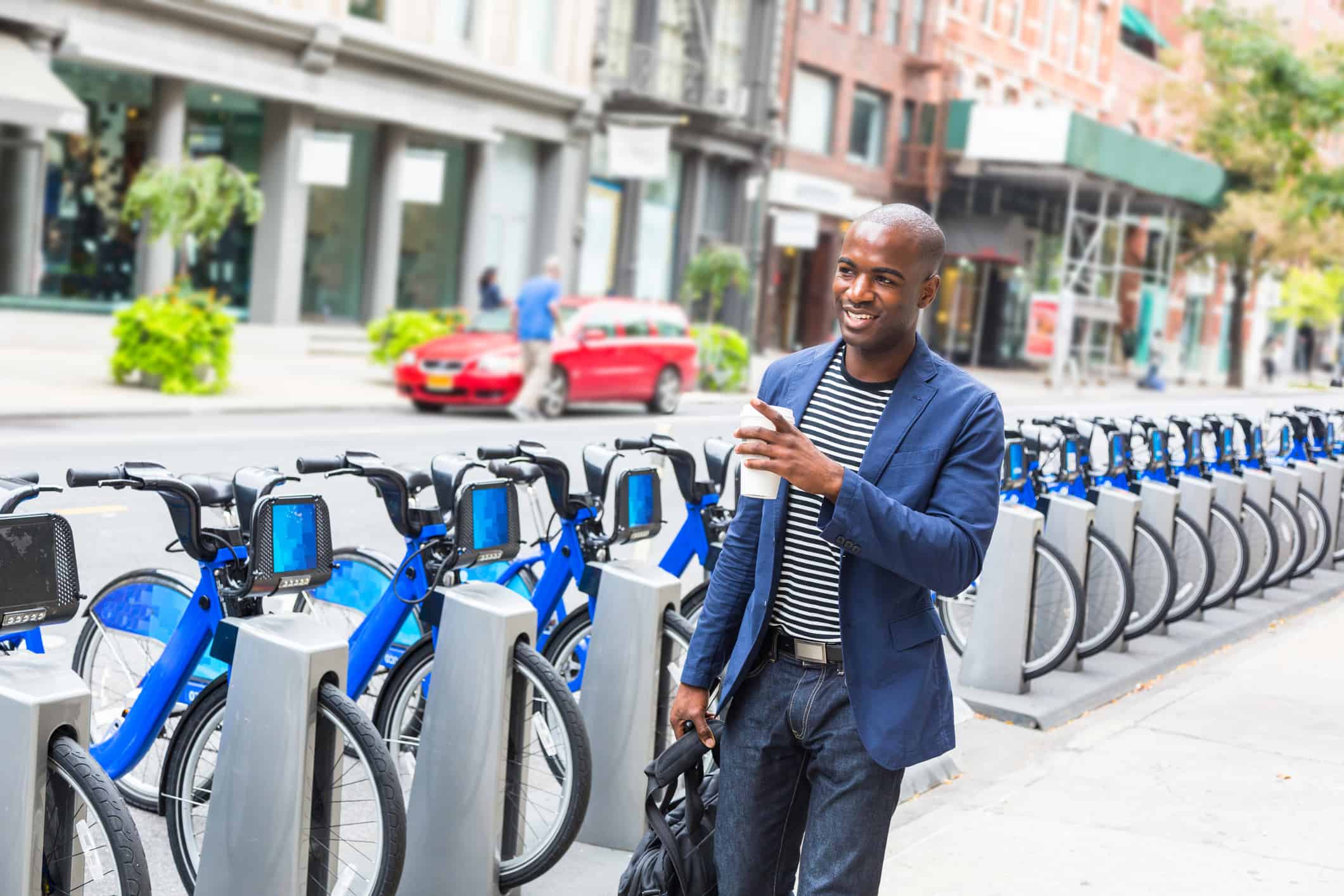Will Politicians Let Unsubsidized Bike Share Compete?

 Bike-sharing has become all the rage in cities across America. With the twin goals of increasing “active transportation” and solving mass transit’s chronic first- and last-mile access problems, these cities have also lavished bike-share providers with generous public subsidies with extremely mixed results. New developments in this space may resolve many, if not all, of the existing complaints surrounding bike-share programs, but only if city officials get out of the way.
Bike-sharing has become all the rage in cities across America. With the twin goals of increasing “active transportation” and solving mass transit’s chronic first- and last-mile access problems, these cities have also lavished bike-share providers with generous public subsidies with extremely mixed results. New developments in this space may resolve many, if not all, of the existing complaints surrounding bike-share programs, but only if city officials get out of the way.
I’ve been a critic of bike-sharing programs, noting that the subsidies tend to have a tiny impact on urban traffic patterns, meaning these programs in practice produce only private benefits to the subsidized users rather than the social benefits often touted by bike-share boosters. Bike-sharing also disproportionately cannibalizes ridership and revenue from financially unstable mass transit systems, which the truly transit-dependent (the poor, elderly, and disabled) rely upon. They are not able to take advantage of dock-based bike-share systems, as the stations are generally concentrated in high-income neighborhoods to serve those systems’ disproportionately young, healthy, affluent, white male customer bases.
Indeed, the most recent rider demographic survey data from Washington, D.C.’s government-supported Capital Bikeshare system suggests some of these inequitable trends are not improving or even worsening:
- From 2011 to 2016, Capital Bikeshare’s customer base went from 81 percent white to 80 percent white (just 45 percent of metro area workers are white).
- With respect to gender over that same period, males went from 55 percent to 58 percent of Capital Bikeshare users (just 45 percent of metro area workers are male).
- Age disparities did see some improvements from 2011 to 2016, with the percentage of users under 35-years-old declining from 66 percent to 51 percent (just 34 percent of metro area works are under 35), with some growth among those who are older than 45 years of age.
- Average incomes greatly increased from 2011 to 2016, with Capital Bikeshare riders having household incomes of $100,000 or more per year increasing from 39 percent to 52 percent (similar to the metro area average, but extremely high given that Capital Bikeshare users are much more likely to be young and unmarried).
- It’s also worth noting that the majority of Capital Bikeshare users both own their own cars and their own bikes.
There is nothing intrinsically wrong with bicycling or bike-sharing. But current subsidized municipal bike-share systems, such as Capital Bikeshare, are just not justifiable under either efficiency or equity criteria. Setting aside debate over the Mohring effect, if public transit subsidies are to exist, it seems they should at least seek to provide transportation services for those who cannot otherwise afford to make basic commuting and personal trips—the truly transit-dependent population. In this context, traditional bike-share programs lavish public subsidies on residents who can more than afford to pay for their own transportation services.
Things may be changing and changing for the better. There’s a new kid on the bike-share block, one that seeks to disrupt the very foundations of status quo bike-sharing in the U.S. One major disadvantage of current bike-share programs from both efficiency and equity standpoints is that they rely on expensive, station-based infrastructure, where users begin and end their trips at geographically-fixed docks. Startups such as Spin and LimeBike have a solution: dockless bike-share. It’s like car2go, but for bikes. Not only that, but these new companies are not demanding large government subsidies. They believe their systems can actually earn a profit in the marketplace.
After Seattle’s subsidized station-based bike-share system failed, the city opted to embrace markets and competition. Rather than attempting to launch another expensive bike-sharing program, the city allowed three private dockless bike-share companies to set up shop, with more to likely follow. Users are able to pick up and drop off bikes throughout the city without relying on costly new infrastructure.
Unfortunately, these market-driven entrants face numerous barriers across the country. Many municipal leaders are concerned that giving riders the ability to leave their bikes anywhere will generate what amounts to bike litter. But these companies have every interest in maximizing revenues, which means they will both keep track of their bikes (through GPS and cellular connectivity) and reposition them as needed to ensure their customers maintain access to the services they are selling.
But a bigger problem facing these new competitors are cronyist monopoly contracts many cities have signed with their existing subsidized bike-share providers. Miami has a de facto 10-year exclusivity agreement with Deco Bike. So does neighboring Miami Beach. Tempe, Arizona, last year signed a five-year exclusivity agreement with CycleHop. All of these monopoly contracts soak both the taxpayers and current and potential bike-share users by denying them less costly, superior service that could otherwise be available to them. Earlier this year, Miami Beach began impounding LimeBikes after the subsidized monopoly provider ratted them out for being “an unauthorized bike-sharing operation.”
Of course, government-supported monopolists have their defenders. Kate Fillin-Yeh, director of strategy at the National Association of City Transportation Officials (a group with deep ties to the subsidized, station-based bike-share monopolists), recently penned an incoherent screed against “rogue bike shares.” Fillin-Yeh was previously a New York City Department of Transportation urban planner “who wrote what has been called ‘NYC’s bible on bike share’ in 2009.”
Fillin-Yeh complains that upstarts like Spin and LimeBike are “deeply subsidized by venture capital.” In the real world, what she means is they have private investors rather than relying on tax dollars, which is an argument against her favored schemes.
Next she worries about the lack of “equitable service” provided by the private competitors. Citing no evidence to support her claim, she fails to note that the systems she defends are highly inequitable, as the Capital Bikeshare demographic data I cited above makes clear. And she offers nothing but praise for Capital Bikeshare.
But her most absurd attempted argument alleges that private dockless bike-share providers will fail to pay a “living wage.” She cites numerous examples of subsidized bike-share monopolies signing lucrative union contracts. But she cites no evidence of upstart competitors paying less than industry average. And this line of argumentation gets at the heart of what is wrong with monopoly bike-share contracts: they are primarily designed to benefit everyone except consumers and taxpayers. Under the corrupt status quo favored by Fillin-Yeh, monopoly providers get their monopolies, unions get their union dues, politicians and bureaucrats with god complexes get to play god, and affluent users get their subsidized rides. Meanwhile, consumers get fewer choices and taxpayers get hosed. Just be sure to slap meaningless buzzwords like “equitable service” and “living wage” on top of municipal cronyism and—poof!—problem solved.
Early municipal involvement in bike-sharing was likely a mistake. Cities locked themselves into costly contracts to permit monopoly providers to offer an inferior service. The good news is they now have an opportunity to correct their past errors—and all it requires is allowing unsubsidized companies to compete for customers.